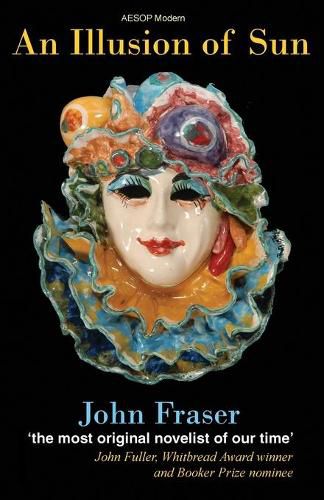Readings Newsletter
Become a Readings Member to make your shopping experience even easier.
Sign in or sign up for free!
You’re not far away from qualifying for FREE standard shipping within Australia
You’ve qualified for FREE standard shipping within Australia
The cart is loading…






An Illusion of Sun is the first of John Fraser’s 19 novels (18 published, one forthcoming). ‘I wanted to do a novel that smelled of fascism (I hope not a fascist novel!) -’ Fraser says ‘- the slaughterhouse, the canals, the fruit - every kind of South and Central European fascism, from Franco to Tiso and Dolfuss, its impregnation of other discourses, from democracy to socialism . It was intended to show how that virus had penetrated the bourgeoisie, its philosophy and its theorists, the ornamental style itself the modesty veil thrown over.'The novel is located in a Slavonic Venice, a city in a state of decline. Perrina attempts to salvage her decaying palazzo both from the depradations of time and the ambiguous bureaucrats who seem to have designs on her as well as on the mansion. Torgano establishes a difficult and masochistic relation with Perrina, her concerns - and the city itself. A liberation seems to lie in leaving her and the city, but will this resolve anything? Of Fraser’s unique writing, the distinguished poet John Fuller has commented: 'In Fraser’s fiction the reader rides as on a switchback or luge of impetuous attention, with effects flashing by at virtuoso speeds. The characters seem to be unwitting agents of chaos, however much wise reflection Fraser bestows upon them; they move with shrugging self-assurance through circumstances as richly detailed and as without reliable compass-points as a Chinese scroll.
$9.00 standard shipping within Australia
FREE standard shipping within Australia for orders over $100.00
Express & International shipping calculated at checkout
An Illusion of Sun is the first of John Fraser’s 19 novels (18 published, one forthcoming). ‘I wanted to do a novel that smelled of fascism (I hope not a fascist novel!) -’ Fraser says ‘- the slaughterhouse, the canals, the fruit - every kind of South and Central European fascism, from Franco to Tiso and Dolfuss, its impregnation of other discourses, from democracy to socialism . It was intended to show how that virus had penetrated the bourgeoisie, its philosophy and its theorists, the ornamental style itself the modesty veil thrown over.'The novel is located in a Slavonic Venice, a city in a state of decline. Perrina attempts to salvage her decaying palazzo both from the depradations of time and the ambiguous bureaucrats who seem to have designs on her as well as on the mansion. Torgano establishes a difficult and masochistic relation with Perrina, her concerns - and the city itself. A liberation seems to lie in leaving her and the city, but will this resolve anything? Of Fraser’s unique writing, the distinguished poet John Fuller has commented: 'In Fraser’s fiction the reader rides as on a switchback or luge of impetuous attention, with effects flashing by at virtuoso speeds. The characters seem to be unwitting agents of chaos, however much wise reflection Fraser bestows upon them; they move with shrugging self-assurance through circumstances as richly detailed and as without reliable compass-points as a Chinese scroll.